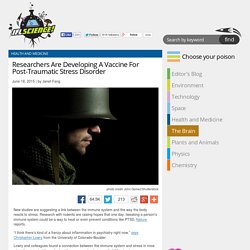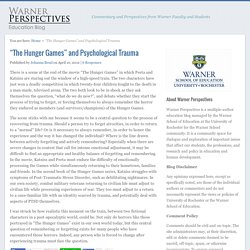

Researchers Are Developing A Vaccine For Post-Traumatic Stress Disorder. New studies are suggesting a link between the immune system and the way the body reacts to stress.

Research with rodents are raising hopes that one day, tweaking a person's immune system could be a way to treat or even prevent conditions like PTSD, Nature reports. “I think there’s kind of a frenzy about inflammation in psychiatry right now,” says Christopher Lowry from the University of Colorado-Boulder. Lowry and colleagues found a connection between the immune system and stress in mice when they injected the rodents with a common bacterium called Mycobacterium vaccae once a week for three weeks to modulate their immune systems.
These mice were tested against a group of untreated mice by putting both in cages with larger animals. The untreated mice were more timid, and later on they developed stress-based reactions, such as an inflamed colon. Lowry's team conducted a second experiment that reached a similar conclusion. [Via Nature] War-Time Defenses: PTSD and Trauma in "The Hunger Games" Series. The Hunger Games vs. the Reality of War. In this essay exploring the reality of war, West Point graduate and Iraq War veteran Paul K.

Chappell (author of Will War Ever End? , The End of War, and Peaceful Revolution) critiques the unrealistic depictions of war, violence, and trauma in the best-selling book The Hunger Games. Author’s Note: I wrote this because the first book in The Hunger Games series has become required reading in many schools. When students are required to read a book for a class they have a reasonable expectation of being educated, but The Hunger Games portrays serious subjects such as war, violence, and trauma in very unrealistic ways. I hope the following will encourage critical thinking, promote discussion, and help people better understand war.
Imagine yourself sitting in a doctor’s office. How do you think most people would react upon hearing this grim news? There is a common myth in our society that human beings are naturally violent. Grossman asks us to consider two scenarios. Think about it. Paul K. Psychology of The Hunger Games. “My name is Katniss Everdeen.

Why am I not dead? I should be dead.” Katniss Everdeen, the Girl on Fire, who volunteers to take her sister’s place in the monstrous Hunger Games, is a hero and a legend. After going through some of the most horrific events imaginable, Katniss attempts to end her own life. What caused her to try to commit suicide? To answer the first question in regard to what caused Katniss to attempt suicide, let’s take a look at what lead up to it. Katniss spent the next few years hunting for food for her family with her friend, Gale Hawthorne. “The Hunger Games” and Psychological Trauma. There is a scene at the end of the movie “The Hunger Games” in which Peeta and Katniss are staring out the window of a high-speed train.

The two characters have just won a deadly competition in which twenty-four children fought to the death in a man-made, televised arena. The two both look to be in shock as they ask themselves the question, “what do we do now?” , and debate whether they start the process of trying to forget, or forcing themselves to always remember the horror they endured as members (and survivors/champions) of the Hunger Games.
A VA Psychiatrist at The Hunger Games (Non-Spoiler Edition) « Paving the Road Back. When I told my older daughter that I was planning on doing a couple posts on Suzanne Collins’ Hunger Games trilogy, she smiled knowingly and purred, “Well, Dad, I guess there goes your street cred, huh?”

I suspect she probably knows whereof she speaks. Yet before you join her in your own eye-roll of eye-rolls, consider this: first, I was never planning on reading these books until I ran across an entry in the blog, The PTSD Diary: Two People in Love, Dealing with PTSD/TBI, written by Nicole, the wife of JR, a veteran of the initial invasion of Iraq. On March 13, 2012, she wrote that Collins had been inspired to write the books partially as a response to the current conflicts, and she then went on to say, “I hope . . . that as teenagers and adults read the books and watch the movies, . . . there may be a greater understanding about how traumatic experiences affect people.
Yes, the books are fiction, but the subjects are surprisingly real.” Two preliminary matters: 1. How Bad Is Katniss' PTSD in The Hunger Games? We Asked the Experts. Murray Close/Lionsgate This article was written by the psychiatrists of Broadcast Thought—Dr.

Vasilis K. Pozios and Dr. Praveen R. Kambam. The Hunger Games: Mockingjay—Part 1 opens with a very telling scene. Psychological trauma is pervasive for Katniss (Jennifer Lawrence). So, Does Katniss Meet the Criteria to Be Diagnosed with PTSD? Although it’s become fashionable to use psychiatric terms such as “PTSD” in a colloquial sort of way, post-traumatic stress disorder is actually a strictly defined mental disorder that can be severely debilitating. PTSD Criteria 1: Trauma To be diagnosed with PTSD, one must of course be exposed to a traumatic event.